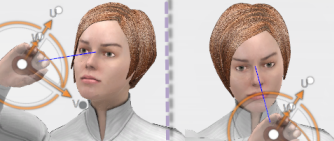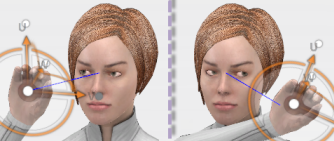Manipulate, Reach, Interact Dialog Box | ||
| ||
Manipulate, Reach, or Interact Command
- Manipulate
 , Reach
, Reach
 or Interact
or Interact

- Select between these icons for the manikin.
These are the same icons that are in the action bar.
Collision Detection
Collision Detection contains the following options:
- Detect and Select
-
- Show Collision - Shows the collision in the 3D geometry window.
- Stop on Collision - Stops the movement when encountering a collision.
The Detect and Show Collision option is on during the Hand Grasp usage by default. This option comes back to its original setting when the Hand Grasp command is not active anymore.
Body Motions Manager
- Add Motions
-
Dependent on your selection, these commands appear.
- Bend
-
When Bend is active, the manikin rotates forward causing a stooped pose.
Select:- Spline
- and
- Pelvis - when active, the pelvis rotates forward causing a stoop pose.
- Twist
- Activated the manikin's hip twists.
- Sway hips
- Activate to sway the manikin's hips:
- In Balance
- Unconstrained
- Move Up-Down
- When active, the manikin's hip moves down (the manikin squats) when dragging the Robot. This option also triggers the availability of Rise on Toes.
- Rise on Toes
- Activated, the manikin rises on their toes and this applies to both feet together. To be accessible, this option needs to have the pelvis free of moving along the vertical axis. This condition is met when the pelvis Move Up/Down option is selected or when the handle is specify directly on the pelvis.
- Add Behaviors
- Dependent on your selection, these commands appear.
- Look At
-
You can select an active hand, right or left hand, and the manikin's eyes and head follows that hand. To reset the eyes or the head, from the body node in the manikin's tree, right-click Line of Sight, Line of Sight object, Reset, or Head.
- Optimize with
-
This allows you to use the Postural score, RULA Score, or neither. If the selected manikin has no preferred angles defined, the option about Preferred Angles scores is still available. At the selection of this option, and if finding no preferred angles, a message asking for preferred angles with scores displays.
- Keep Free Arm Down
- This keeps the arms down when moving the manikin's posture. Example is when the manikin is bending over and the arms stay down or move along with the body.
- Adjust Gaze Motion
-
This allows you to obtain a corresponding head, and eye rotation by adjusting the line of sight to a given a target location in space. This way, the manikin has a natural Look At posture with eye motion (the eye ball) that follows the line of sight.
- Head, Eyes
-
Use these settings to alter the contribution ratios for the manikin. From one spectrum to the other, the head moves or at the other end, the eyes. Using the slider, you can select head movement, or eye movement, or a combination of both.


If the line of sight has changed, the eyes rotate toward the new direction of the line of sight. The direction of the eyes rotating calculates with or without a focal point to evaluate which direction has the better appearance.
Note: The gaze motion prediction algorithm is based on research conducted in the Human Motion Simulation Laboratory at the University of Michigan (www.humosim.org).